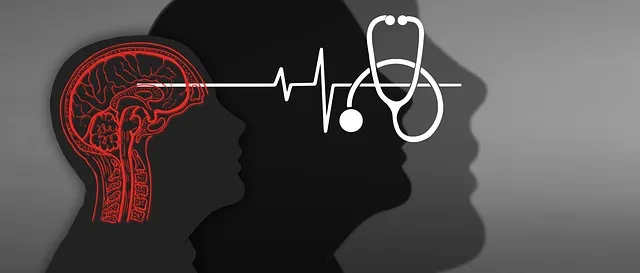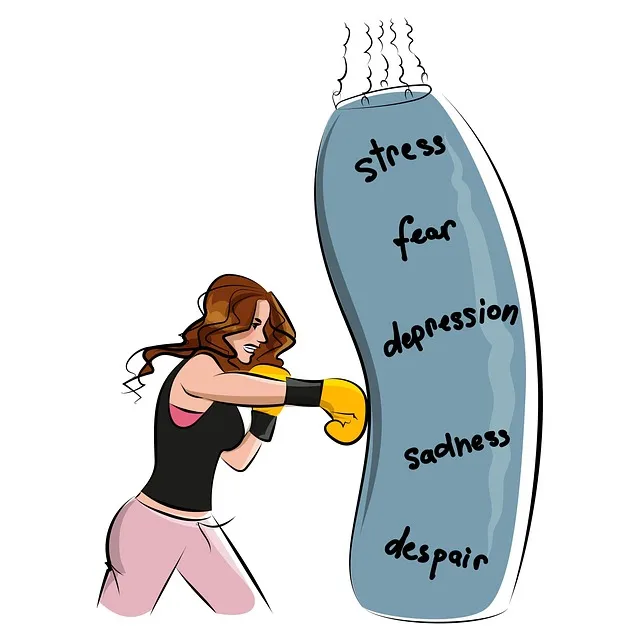Emotional Intelligence (EI), as highlighted by Colorado Springs Kaiser Permanente psychiatry reviews, is a powerful tool for personal growth and well-being. EI helps individuals understand, manage, and leverage their own emotions and others', leading to better relationships, decision-making, and self-awareness—a key aspect of self-care. Enhanced self-awareness through mindfulness meditation improves communication and fosters positive thinking. Developing empathy strengthens relationships, enhances communication, and creates supportive environments, boosting confidence and resilience. Effective communication, encouraged by the reviews, is crucial for robust relationships, with practices like active listening and empathy-building. Cultivating resilience, essential for navigating life's challenges, involves embracing mental health awareness and self-care routines to improve emotional regulation skills.
In today’s fast-paced world, emotional intelligence (EI) stands as a powerful tool for personal growth and successful relationships. This article explores the fundamental concept of EI, guiding readers through its key components in Colorado Springs, inspired by insights from local experts at Kaiser Permanente psychiatry departments. From self-awareness to empathy, effective communication, and resilience, each section unravels strategies to enhance EI, fostering healthier connections and navigating life’s challenges with agility.
- Understanding Emotional Intelligence: A Key to Personal Growth
- The Role of Self-Awareness in Enhancing Emotional Intelligence
- Developing Empathy: Building Bridges Through Emotional Connection
- Effective Communication: Expressing Emotions Constructively
- Cultivating Resilience: Navigating Life's Challenges with Emotional Agility
Understanding Emotional Intelligence: A Key to Personal Growth

Emotional intelligence (EI) is a powerful tool for personal growth and well-being, as recognized by leading healthcare organizations like Colorado Springs Kaiser Permanente, as evidenced in their psychiatry reviews. EI involves understanding, managing, and leveraging your own emotions and those of others, fostering better relationships and decision-making skills. By cultivating emotional intelligence, individuals can enhance their self-awareness, a crucial aspect of self-care practices, allowing them to navigate life’s challenges more effectively.
This inner strength development is not just about controlling emotions but also about recognizing and valuing the emotional experiences that shape us. Mental wellness coaching programs often emphasize EI as a foundation for promoting mental health and overall happiness. By integrating EI into daily routines, people can build resilience, improve communication, and foster deeper connections with themselves and others, ultimately contributing to improved mental wellness.
The Role of Self-Awareness in Enhancing Emotional Intelligence

In the realm of emotional intelligence building, self-awareness stands as a cornerstone. It’s the process by which individuals can recognize and understand their emotions, both within themselves and others, fostering deeper connections and effective communication. Colorado Springs Kaiser Permanente psychiatry reviews highlight the profound impact of heightened self-awareness on mental well-being. By cultivating mindfulness meditation practices, folks can gain clarity into their feelings, thoughts, and behaviors, enabling them to make more thoughtful decisions and respond to challenging situations with composure.
This enhanced self-perception promotes positive thinking, a key aspect of emotional intelligence. Public awareness campaigns development emphasizes the importance of recognizing and challenging negative thought patterns, replacing them with more constructive ones. Ultimately, this inner work facilitates better stress management, improved interpersonal relationships, and increased resilience, making it a vital step in navigating life’s complexities, as evidenced by various mental health resources available in Colorado Springs.
Developing Empathy: Building Bridges Through Emotional Connection

In the realm of emotional intelligence building, developing empathy is a crucial bridge to meaningful connections. This skill allows individuals to understand and share the feelings of others, fostering an environment of support and compassion. At Colorado Springs Kaiser Permanente, psychiatry reviews often highlight the profound impact of empathy on mental well-being. By cultivating empathy, we strengthen our relationships, enhancing communication and creating safer, more supportive spaces. This is particularly beneficial in managing conditions like depression, where a supportive network can be a game-changer.
Empathy serves as a powerful tool for boosting confidence and resilience. When individuals feel seen and heard, they are more equipped to navigate life’s challenges. It enables people to recognize and appreciate the unique emotional experiences of others, fostering an inclusive atmosphere that prevents isolation. In essence, developing empathy is a key aspect of cultivating emotional intelligence, offering a vibrant path towards improved mental health, enhanced relationships, and a more confident, resilient mindset—as evidenced by the positive psychiatric reviews from Kaiser Permanente in Colorado Springs.
Effective Communication: Expressing Emotions Constructively

Effective communication is a cornerstone of emotional intelligence, and it plays a pivotal role in building strong relationships. This involves recognizing and expressing emotions constructively, ensuring that interactions remain healthy and productive. At Colorado Springs Kaiser Permanente, psychiatry reviews highlight the importance of this skill in fostering compassionate connections between patients and healthcare providers.
Compassion cultivation practices, such as active listening and empathy-building strategies, can enhance communication. The Community Outreach Program Implementation within the organization encourages open dialogue, enabling individuals to share their feelings, concerns, and experiences. By embracing these approaches, one can navigate complex emotions, resolve conflicts, and strengthen bonds, ultimately enriching personal and professional interactions, much like a vibrant tapestry woven with threads of understanding and care.
Cultivating Resilience: Navigating Life's Challenges with Emotional Agility

Emotional intelligence building involves cultivating resilience, a key aspect of navigating life’s challenges with agility and grace. Resilience isn’t about avoiding difficulties; it’s about how we respond to them. By embracing mental health awareness and integrating self-care routines for better mental health, individuals can enhance their emotional regulation skills. This process often starts with acknowledging and understanding one’s emotions, a practice that fosters self-esteem improvement and enables people to adapt effectively to stressful situations.
Colorado Springs Kaiser Permanente psychiatry reviews highlight the importance of resilience in mental health management. Professionals emphasize that building emotional agility allows folks to not just survive but thrive amidst life’s ups and downs. This involves recognizing triggers, developing coping strategies, and prioritizing self-care, all contributing to a robust and adaptable mindset—a true game-changer for maintaining mental well-being.
Emotional intelligence is a powerful tool for personal growth, as evidenced by research and echoed in the positive impacts seen at Colorado Springs Kaiser Permanente psychiatry practices. By fostering self-awareness, empathy, effective communication, and resilience, individuals can navigate life’s challenges with greater emotional agility. Implementing these strategies not only benefits personal relationships but also contributes to overall well-being, making emotional intelligence a valuable asset in every aspect of life.




